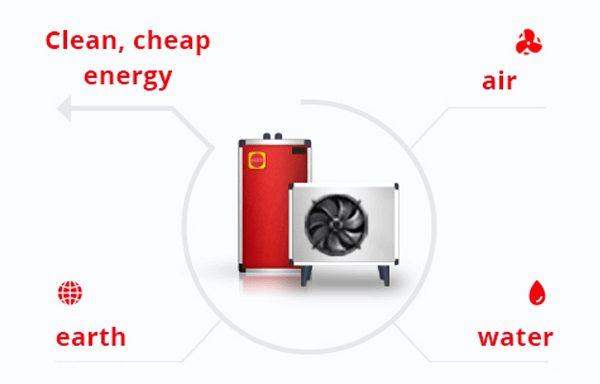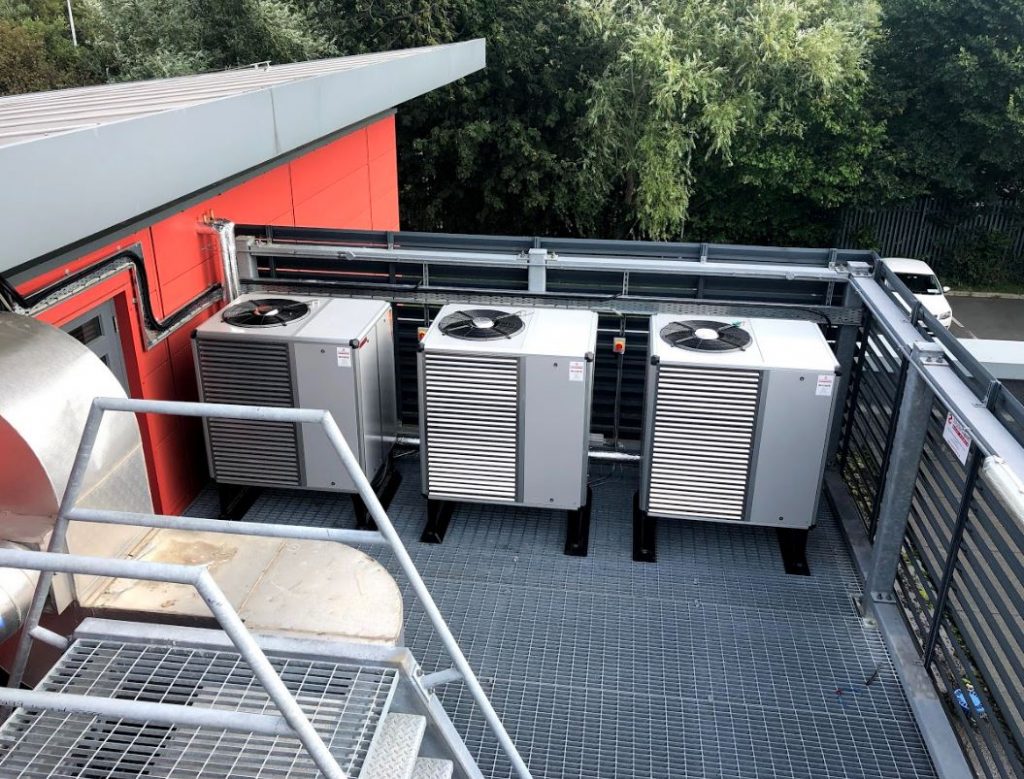
How to Prepare For Your Heat Pump Installation
Heat takes up a large part of the energy consumption in Ireland. Therefore a large section of the cost of owning a house. Companies like MasterTherm are striving to lower that statistic, by doing heat pump installations in more and more homes. These silent renewable energy sources can work away, heating your home with ease while keeping your carbon footprint down.
Do Heat Pumps Work The Same as Boilers?
Boilers work like a kettle. They use a combustion chamber where the combustion of air occurs by burning gas or oil. This hot air is put through a heat exchanger to convert it into heat energy. This energy is then used to boil up all of the hot water.
While heat pumps do use an exchanger, the important difference is that they do not use a combustion chamber. Instead of combusting oil or gas, a heat pump gathers its heat energy from natural sources. These natural sources can be the air, water or ground.
The heat that is collected from these natural resources is compressed repeatedly until it is at a temperature hot enough to heat your home and water.
The heat can then be distributed via standard radiators or underfloor heating.
A Heat Pump installation as a Gas Boiler Replacement
A typical air to water heat pump would cost 4c to run per kWh of heat. Whereas a gas boiler would be 8c and an oil boiler would be around 15c. We consume thousands of kWh a day. So the savings make a significant difference to our overall utility costs in a year. Another benefit is that you’re moving from fossil fuels to renewable sources. As heat pumps are constantly circulating their process to condense more energy, there is constant energy being transferred into heat. This means roughly every 1kW of electricity used produces up to 3kW of energy.
SEAI Grants for Heat Pump Installations
The Sustainable Energy Association of Ireland is offering significant grant support for the installation of heat pumps into buildings built before 2011 that are used as homes and businesses. First, you need an advisor to look at your building and tell you if it is suitable for a heat pump installation. This costs €200 which SEAI will cover the cost of. The advisor will use a very specific heat loss indicator.
This heat loss indicator will consider how good your insulation is and if your home is airtight.
If your house loses too much heat then you may need to make changes before installing your heat pump. This could include triple glazed windows, extra insulation or fixing any small openings that may be causing drafts in your building.
If you meet the standards needed (2 Watts/Kelvin/m2) you may be eligible for a grant of €3,500.
How Do I Know If My House Is Suited To A Heat Pump Installation?
t is important to seek professional advice on the matter of whether you are suited to a heat pump or not. Technically, you can install a heat pump into any building, but it may be more hassle than it’s worth. This means that you may need to install insulation and more energy-efficient windows. However, to preserve heat energy and make your house more sustainable, these changes should be made regardless. They just may need to be made over time, as it can be a lengthy and expensive process. Luckily SEAI is offering grants to make houses more energy-efficient.
Whether you can install a heat pump into your building comes down to how much money you are willing to invest. This is especially relevant if you do not meet the heat loss requirements. However, it is worth remembering that the benefits are not purely financial. Heat Pumps deliver a more efficient and comfortable and even temperature as well as volumes of hot water being available 24/7.
Do I Need A Completely New Central Heating System?
Most radiators and existing heating systems may be used with a heat pump system. This is especially useful if your pipework is built into your walls and floors which would make it expensive to remove or replace.
The heat travelling through a system operating with a heat pump doesn’t need to operate at the high temperatures of gas or oil boilers. Systems with a larger surface area like underfloor heating are particularly suited to the heat pump system.
What If The Hot Water Runs Out?
While heat pumps are made to heat the desired space consistently and comfortably the priority of a heat pump system is to provide domestic hot water first. Domestic hot water operates at higher temperatures than central heating. The amount of water that can be stored and heated normally cannot be guaranteed. However, all MasterTherm heat pumps prioritise hot water. Additionally have a backup electric boiler when you may need that additional volume of hot water.
How Much Can I Save?
Heat pumps can save you a LOT of money on your monthly bills because your gas or oil bills will be eliminated. However, your electricity bill may increase slightly, depending on your heat loss rating. If you are an A2 or A3 home and have a large surface area heating system such as underfloor heating, your bills can be extremely low. Possibly as low as €300 per year. If you have no insulation and single glazed windows, you may not find the savings as significant. However, you will still enjoy the comforts of even heat in your home.
Air-to-Water Heat Pump Benefits
Air-To-Water heat pumps are the most common because they are the easiest to install. They also have the least amount of requirements. If you do not own a certain amount of land or a water source like a well or lake, ground and water source heat pumps can be difficult or impossible to install.
The air to water pumps can be fitted on any building like an air conditioner. They are also the least expensive option and the mechanics are understood by most mechanics.
How are the Noise Levels?
All of the masterTherm heat pumps run with an incredibly silent operation. Our new DC fan ensures minimal noise levels. While it is not recommended to place your air to water heat pump right outside your bedroom window, the noise should be minimal (around fridge volume) and should not affect you or your neighbours.
How Long Does Heat Pump Installation Take?
After checking that everything is ready for your heat pump to work efficiently in your home, an air to water heat pump system should only take two days. These days will consist of setting concrete to support the external unit. The balance will be removing your old boiler and connecting your heat pump system.
However, this depends on the quantity of heat needed, if you are heating a larger building you may have decided to get multiple zones in the system which may take longer to install.
If you are installing a ground to water heat pump it may take a bit longer as there is earthwork required.
What is the Heat Pump Cost
If you have all of the required insulation and double or triple glazed windows and your house is not losing heat, then a heat pump could cost as little as €7,000 (€3,500 after the grant is applied). The average cost including insulating houses in 2018, however, was around €11,000.
It is impossible to accurately say how much the cost would be for you without undergoing a proper assessment of your building so it is always preferable to have a proper technical assessment.
Will My House Value Go Up?
If you have installed insulation, triple-glazed windows and a long-lasting heat pump it would make your home extremely energy efficient which in turn would increase your house value.
Why Mastertherm
Heat pumps can be used in any industry that requires heating or cooling. Including refrigeration, cold water, hot water or a heating system. A MasterTherm heat pump can be an efficient way of repurposing heat energy that otherwise would have been wasted. This will make your company more sustainable and economical.
Mastertherm heat pumps are ultra-quiet and have a 7-year warranty. Because they use inverter technology they can be controlled easily from a device, giving you lower heating bills.
Mastertherm will design and tailor a personalised heating system to suit your industry needs. Whether it’s for a monitored heating and cooling system or a central heating system with air-conditioning. So, they will ensure that your business is getting the maximum benefit from your heat pump system.
If you’re looking for a heating and hot water solution for a large complex building they may suggest multiple heat pumps working together. If you are unsure about how to start the journey to renewables using heat pumps, contact them and they can start by creating a bespoke design for your heating system.
Share This Article
WOULD YOU LIKE TO SEE YOUR HOUSE FEATURED ON FINISHED.IE?
Please click on the button bellow and fill the Featured House submission form.








